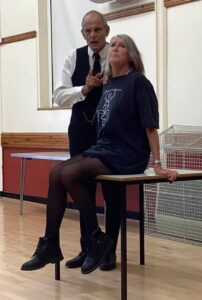
Some of us (many thanks to Diane for the loan) have been reading Shakespeare: The Man Who Pays the Rent. This is the account of a fascinating series of conversations between Dame Judi Dench (National Treasure) and Brendan O’Hea, Actor and Director and friend of Judi’s. These conversations took place over a period of four years, during which time Brendan read scenes to Judi, or the two of them watched films of her performances, and then discussed individual characters she’d played, aspects of performance, gossip and backstage pranks.
So, in essence, this is Judi Dench at her self-deprecating and honest best, discussing many of Shakespeare’s women. Obviously, I was especially interested in those plays performed over the years by WOAS as I knew them much better. I was particularly interested in her memories of playing both Hermione and Perdita at the same time in a Trevor Nunn production, and more recently, Paulina in the Kenneth Branagh production.
She’s clearly an entertaining speaker (you can hear her voice throughout the book and an audio version, if available, would be a treat!). Her thoughts and perceptiveness and sense of humour in recounting amusing anecdotes made for enjoyable and interesting reading, and at the same time I learnt a huge amount. The book is peppered with her sketches of characters and props (remarkably good sketches) which she eventually agreed to have included as encouragement for anyone else with severely impaired sight.
Enough from me – read it yourself!








